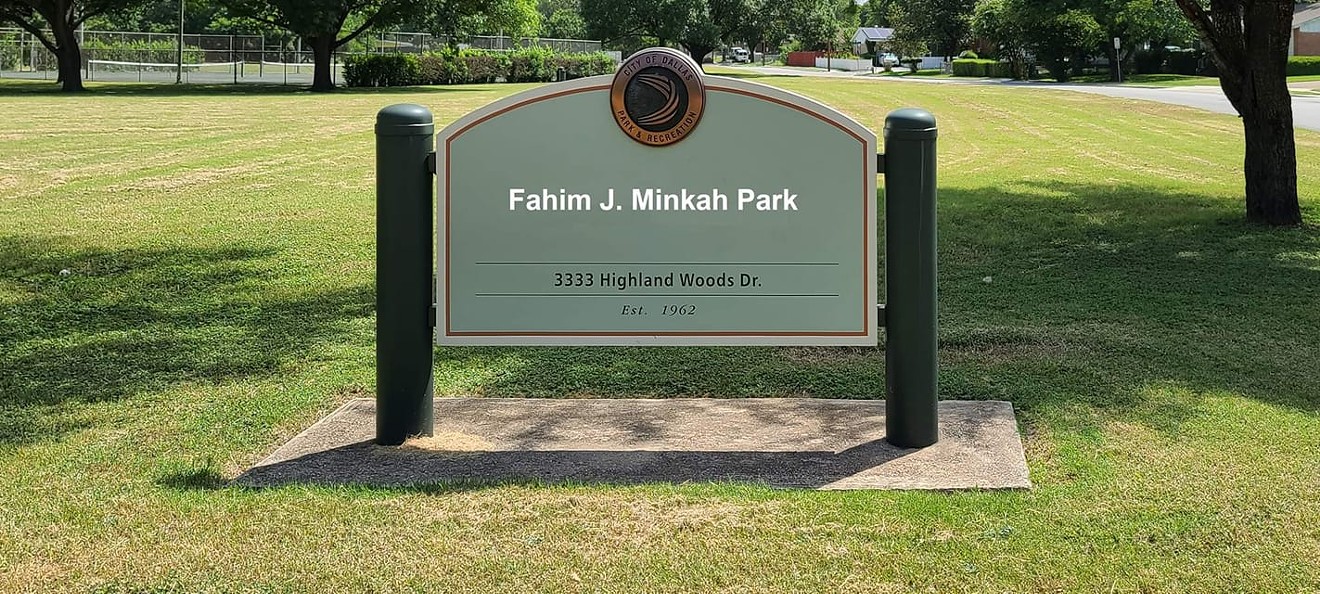Local activist Yafeuh Balogun and several others submitted the application to rename the park. They’ve created a group called Friends and Family of Fahim J. Minkah to advocate for the name change. The people behind the group include Balogun and local organizers Davante Peters, Marcus Russell and Talissa Shamsid-Deen.
"We want to honor an elder activist that gave his entire adult life to service of the community," Balogun said.
He and the others have been influenced by Minkah in their activism. In the late ’80s and early ’90s, crime in Dallas reached an all-time high, with more than 500 homicides in 1991. In 1989, Minkah organized a group he called the African Men Against Narcotics Drug Fighters (AMAN Drug Fighters for short).
At the time, he told news outlets the group was meant to combat the lack of police protection in South Oak Cliff. His group would conduct armed patrols in neighborhoods and apartment complexes that had come under siege by drug pushers in the middle of a crack cocaine epidemic. The idea was to find the drug dealers in these places and harass them until they left.
Years later, Balogun, Russell and Peters would help organize armed patrols in their own neighborhoods in an attempt to help reduce crime.
On top of the AMAN Drug Fighters patrols, Minkah wanted to provide social services through his nonprofit United Front of Dallas and more recreational activities for children and families. Without those things, Minkah thought, it was no wonder people in his community were turning to drugs."We want to honor an elder activist that gave his entire adult life to service of the community." – Yafeuh Balogun, local activist
tweet this
"We needed something in this neighborhood that would generate money, that we could circulate into other programs," Minkah recalled in a 1997 Observer article. "We needed something that would serve youth and families, that would promote physical fitness. The best drug prevention is well health."
As a lifelong skater, one of Minkah’s solutions was a roller rink.
Opening in 1999, the place would be called Southern Skates, which later became owned by the city and is still open for business today. It’s just a four-minute drive from College Park which, if Balogun and the group are successful, will bear Minkah’s name. They'd like the park at 33000 Highland Woods Drive to be called the Fahim J. Minkah Community Park.
Minkah, a former member of the original Black Panther Party, also owned an auto repair shop about a quarter mile away, and much of his work was done in the surrounding area. All of these are reasons that Balogun and others think the park should be renamed after him.
Now that they’ve filed the application for the name change, Balogun and the group are gathering signatures to show the city their efforts have support from the community. If everything goes according to plan, the group will eventually make their case for the name change at a hearing with the city’s Park and Recreation Board.
Balogun, Peters and Russell were among those behind efforts that saw a portion of Dallas' Lamar Street renamed after Botham Jean in 2021. The 26-year-old Jean, a Black man, was shot dead by a white off-duty Dallas police officer in his own apartment. These efforts are part of something the group calls "landscape reparations," a term created by local author Edward Sebesta. The idea is to make the local landscape more representative of the communities that built and live in them.












